Edie Melson's Blog, page 57
March 24, 2024
How Does a Writer Find Stories

by Ane Mulligan @AneMulligan
In a Facebook group I'm in, one of the members asked how we all find our stories. It's revealed some interesting ways.
Places and Ways to Look for the Stories We Write
Overheard conversations: Okay, let's be honest. Writers eavesdrop. Restaurants are a great place to listen, too. That's how the premise for Chapel Springs Revival came about. I overheard an unusual conversation and thought, "If this person feels this way, there are more who do too."
Real life: Chapel Springs Survival was sparked by my eldest son, who called me one day and told me to look at the email he just sent. Then he hung up. I looked. And what I saw changed our lives forever. Can you say 21st Century mail order bride? And I told him for not telling me beforehand, it was going in a book. And it did.
Another Chapel Springs book, Home to Chapel Springs, also came out of real life. At the age of 62, I found my birth sisters. I decided to use that as the basis for a story. I had to change a lot, but it worked. You can read about my discovery here .
It doesn't take a lot to spark an idea. However, be careful. You will have to change a whole lot. The daughter-in-law from Chapel Springs Survival had to become an antagonist for the story to not be cliché. She gave her permission, and in the author's note, I told the real story. She's the best thing that ever happened to our son.
A friend suggested I try a historical novel set in the Great Depression. The idea for the town and grocery came from my childhood summers spent in a tiny rural town with my cousins, who owned a small grocery store. That idea became In High Cotton.
Newspaper articles: I once read an article about the last Confederate War widow interviewed. It was a great story idea, so I sent it to a friend who would be better suited to write the story than I would.
Other articles could have a subject that sparks an idea for a story, and maybe the subject is merely a small part of hte story. The article could be about candy making, but a sentence catches your eye, mentioning a chemical reaction. Voila! The basis for a murder mystery or how the murder happened.
Places: I love old houses. They spark my creative imagination like nothing else. Even in a contemporary story, old houses reveal secrets. And I save photos of them. I can stare at one and before long, a story idea is born. When the tiny house craze hit HGTV, I was fascinated. Then some friends and I decided to do a novella collection. Each story had to have a tiny house in it. That book was Coming Home.
A short story: I recently wrote a short story for my newsletter subscribers for Christmas. I heard back from several readers, and they all wanted more of the characters and the story. I hadn't planned that, but suddenly, a cozy mystery was born. I'm in the midst of writing it. We'll see how it comes out.
Objects: I keep a muse jar and fill it with interesting objects I find. Every so often, I dump it out on my desk and study them. A skeleton key: what is it to? Does the door hide a secret? Is it to a chest, long forgotten? Perhaps it opens a diary. A single earring. Where's its mate? Who wore it? How did she lose one? Is it on a garden path somewhere? What happened to its owner?
Story ideas are all around us. All we have to do is look, listen, and ask. Once something catches my interest, I start asking questions. Asking questions sparks my imagination to go deeper, ask more questions, keep seeking until the story or "what if?" appears.
Most of all, stories seem to find me. So, how do YOU find your stories most often?
TWEETABLEHow Does a Writer Find Stories? Thoughts from author @AneMulligan on @EdieMelson (Click to Tweet)
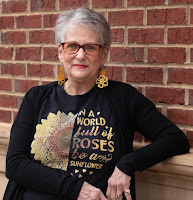 Ane Mulligan lives life from a director’s chair, both in theatre and at her desk, creating novels. Entranced with story by age three, at five, she saw PETER PAN onstage and was struck with a fever from which she never recovered—stage fever. One day, her passions collided, and an award-winning, bestselling novelist immerged. She believes chocolate and coffee are two of the four major food groups and lives in Sugar Hill, GA, with her artist husband and a rascally Rottweiler. Find Ane on her website, Amazon Author page, Facebook, Instagram,Pinterest, The Write Conversation, and Blue Ridge Conference Blog.
Ane Mulligan lives life from a director’s chair, both in theatre and at her desk, creating novels. Entranced with story by age three, at five, she saw PETER PAN onstage and was struck with a fever from which she never recovered—stage fever. One day, her passions collided, and an award-winning, bestselling novelist immerged. She believes chocolate and coffee are two of the four major food groups and lives in Sugar Hill, GA, with her artist husband and a rascally Rottweiler. Find Ane on her website, Amazon Author page, Facebook, Instagram,Pinterest, The Write Conversation, and Blue Ridge Conference Blog.
Published on March 24, 2024 22:00
March 23, 2024
12 Bible Verses to Pray Over Your Writing
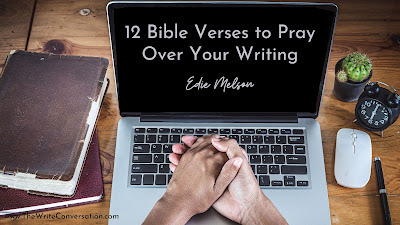
by Edie Melson @EdieMelson
One of my only non-negotiable rules for my own writing is this:
Pray first.
Before my fingers hit the keyboard or pick up a pen, I try to remember to always take time to talk to God. I admit, there are times when I get in a hurry, or when I forget. But I always try to stop and pray as soon as I realize my mistake.
The reason is simple. I don’t want to be someone who writes for God. I want to write with God. I’m not claiming that my writing is inspired and should be elevated in any way. Never!
What I am acknowledging is the fact that without God in control and guiding my fingers and/or pen—the words I write are just that. They are nothing more than words on paper. But with God, those words have the ability to accomplish great things—God-sized things. God knows who needs the words He’s given me and when they need them.
This acknowledgement that God is in control also frees me from so much of the anxiety I feel when I try to control who reads my words and when they are read.
So these are just some of the verses I go to when I’m praying for my writing, for those who read what I write, and for those who are involved in publishing what I write. I hope they bless you as God has blessed me through them.
A Dozen Verses to Pray Before Writing
1. Praying that I won’t doubt my calling or give in to the lie that I’ve squandered my one chance.for God’s gifts and His call are irrevocable. Romans 11:29 (NIV)
2. Praying for those who read my words and those who are publishing my words.First of all, then, I urge that entreaties and prayers, petitions and thanksgivings, be made on behalf of all men. I Timothy 2:1 (NASB)
3. Praying for a joyful heart as I write, edit, and wait for the plans God has. Be joyful in hope, patient in affliction, faithful in prayer. Romans 12:12 (NIV)
4. Praying for God to open doors for the words I write.So I say to you, Ask and keep on asking and it shall be given you; seek and keep on seeking and you shall find; knock and keep on knocking and the door shall be opened to you. Luke 11:9 (Amplified Bible)
5. Praying for God to protect me from myself. My own cruel words can often be the biggest stumbling block I face. The heart is deceitful above all things, and desperately sick; who can understand it? Jeremiah 17:9 (ESV)
6. Praying for God to bring those who will come alongside me for editing, encouragement, and prayer.And I searched for a man among them who should build up the wall and stand in the gap before Me for the land, that I should not destroy it; but I found no one. Ezekiel 22:30 (NASB)
7. Praying for God to protect me from those who would discourage me, accuse me, or speak unkindly. But in that coming day no weapon turned against you will succeed. You will silence every voice raised up to accuse you. These benefits are enjoyed by the servants of the LORD; their vindication will come from me. I, the LORD, have spoken! Isaiah 54:17 (NLT)
8. Praying for God to show me anything that stands in the way of hearing from Him and accomplishing His purpose through the words I’m writing. Therefore, confess your sins to one another, and pray for one another, so that you may be healed. The effective prayer of a righteous man can accomplish much. James 5:16 (NASB)
9. Praying for patience, as I wait for the plans God has for my writing to unfold in His time.For we are His workmanship, created in Christ Jesus for good works, which God prepared beforehand so that we would walk in them. Ephesians 2:10 (NASB)
10. Praying for my stamina and strength to grow, and for me not to become discouraged.But as for you, brethren, do not grow weary of doing good. II Thessalonians 3:13 (NASB)
11. Praying for everything I write to be based in God’s truth, and that God will use my words to glorify Him and bring others to Him. This is good and acceptable in the sight of God, our Savior, who desires all men to be saved and to come to the knowledge of the truth. I Timothy 2:3 - 4 (NASB)
12. Praying for God to use my words in ways beyond what I can hope or imagine. Now to him who is able to do far more abundantly than all that we ask or think, according to the power at work within us,Ephesians 3:20 (ESV)
These are just a few of the verses I use when I’m praying over my writing. I’d love for you to share which verses you go to when you’re praying for your writing. Be sure to leave your thoughts in the comments section below.
Don’t forget to join the conversation!Blessings, Edie
TWEETABLEBible Verse to Pray Over Your Writing from author @EdieMelson (Click to Tweet)
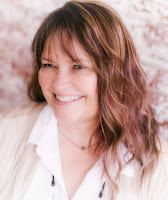 Edie Melson is a woman of faith with ink-stained fingers observing life through her camera lens. She’s a writer who feels lost without that device & an unexpected speaker who loves to encourage an audience. She also embraces the ultimate contradiction of being an organized creative. She knows the necessity of Soul Care and leads retreats, conferences & workshops around the world on staying connected to God. Her numerous books, including the award-winning Soul Careseries & reflect her passion to help others develop the strength of their God-given gifts. Her blog, The Write Conversation is recognized as one of the top 101 industry resources.
Edie Melson is a woman of faith with ink-stained fingers observing life through her camera lens. She’s a writer who feels lost without that device & an unexpected speaker who loves to encourage an audience. She also embraces the ultimate contradiction of being an organized creative. She knows the necessity of Soul Care and leads retreats, conferences & workshops around the world on staying connected to God. Her numerous books, including the award-winning Soul Careseries & reflect her passion to help others develop the strength of their God-given gifts. Her blog, The Write Conversation is recognized as one of the top 101 industry resources. She and husband Kirk have been married 42+ years and raised three sons. They live in the foothills of the Blue Ridge Mountains and can often be found hiking—with Edie clinging to the edge of a precipice for the perfect camera angle and Kirk patiently carrying her camera bag and tripod. Connect with her on her website, www.EdieMelson.com and through social media.
Published on March 23, 2024 22:00
March 22, 2024
Unveiling Subtext: The Power of Indirect Communication in Story
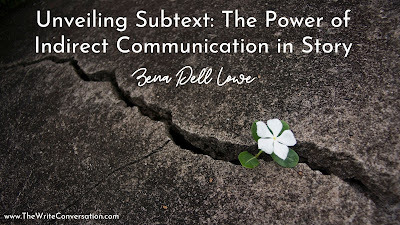
by Zena Dell Lowe @ZenaDellLowe
Everybody talks about the importance of subtext—those subtle layers of communication beneath the surface of the narrative—but understanding it intellectually and executing it effectively are two different beasts. Today I want to dive into the practical intricacies of how you can create subtext in your story, but first, we must have a better grasp of what subtext is.
Defining Subtext
Subtext is “sub,” meaning it’s beneath the text. It’s the silent communication that thrums underneath the spoken words. It’s not overt. It's covert communication, the unspoken truths, the hidden messages that are implied but not readily apparent. It’s also something we’re very familiar with in real life.
Subtext is a strictly human phenomenon that occurs by being in relationship with other humans. It manifests itself in the boss's subtle snub at the meeting, or the stuff the boyfriend didn’t say when you told him you loved him. It’s the anger that came out sideways after your mom made that seemingly “innocent” comment about your cooking. It’s covert communication because it’s subtle and indirect, which gives us room to backpedal and deny. These behaviors, while socially acceptable, are rooted in our innate fears—fear of rejection, fear of change, fear of facing uncomfortable truths.
Fear as the Fuel for Subtext
Subtext is the language that humans speak when we are afraid of something being exposed. It is indirect communication aimed at avoiding direct confrontation. Subtle jabs or snide remarks, dropped hints or clues, exhibiting contradictory human behavior (like smiling to cover up rage), or refusing to communicate altogether (by ignoring texts or ducking phone calls) are all behaviors designed to keep the truth hidden and minimize our own exposure to reality.
Fear, as the primal motivator behind subtext, drives us to cloak our vulnerabilities, to evade direct confrontation, and to shield ourselves from the repercussions of honesty. It's the fear of being seen, of being rejected, or of having to confront painful realities that propels us into the realm of subtextual communication. It’s a way to protect ourselves when we’re too cowardly to tell the truth. We communicate in underhanded ways because we're afraid of the other person's reaction or of the consequences that must follow once that truth is laid bare. Exposed truth demands a response. We can no longer pretend all is well. What happens if you confront your spouse for cheating and they admit it? You would have to do something about it.
We're too afraid to face the pain of the consequences that must follow when a truth is laid bare. So, what do we do instead? We adopt manipulative behaviors and sideways communication techniques that allow us to state the truth indirectly without requiring any direct change on our part. So long as it’s not stated overtly, it gives us the illusion of safety.
Direct Communication Vs. Indirect Communication.
It’s all about direct knowledge versus indirect knowledge because direct knowledge changes everything. Direct knowledge demands a response. We must react. We must make different decisions once the truth is out in the open. But if we keep a lid on it, if we keep it hidden and veiled, now we can stay in our casually convenient relationships without truly causing change. All we must do to live in this fantasy is learn to speak and behave in subtextual ways.
Navigating Subtext in Storytelling
So, how do we translate these nuances of human behavior into our storytelling craft? The key lies in identifying your characters' deepest fears and weaving them into the fabric of your narrative. Subtext is energized by secrets – secret fears in particular. What are your characters hiding? What truths do they wish to conceal, yet long to be acknowledged indirectly? All you must do is figure out who or what your character is afraid of, and then cultivate scenes where they are trying to keep a lid on that thing. By cultivating scenes where these fears simmer beneath the surface, where characters grapple with keeping their truths veiled but inevitably reveal themselves through subtle gestures and evasive dialogue, you breathe life into the subtext of your story and draw readers into the narrative.
Embracing Directness
However, true mastery of subtext doesn't entail perpetuating evasion indefinitely. Rather, it's about understanding that direct knowledge catalyzes change. When truths are laid bare, characters are compelled to react, to make choices that propel the narrative forward. Direct communication disrupts the status quo, forcing characters to confront their fears head-on.
Emboldening Your Craft
In essence, subtext is the language of fear, the clandestine dialogue that underscores human interaction. By embracing the nuances of indirect communication, by peeling back the layers of your characters' fears, you unlock the true potential of your storytelling prowess.
As you embark on your journey to craft narratives brimming with depth and resonance, remember that subtext is more than just a literary device—it's the heartbeat of human emotion, the silent symphony of our deepest fears and desires. So, dare to delve into the shadows, to unearth the hidden truths that lie beneath the surface. For in mastering the art of subtext, you illuminate the very essence of storytelling itself.
Need More Help?
If you're eager to hone your skills further, check out my beta course for storytellers, Hollywood Story Structure Made Easy. In the world of storytelling, understanding the subtleties of subtext is not just an asset—it's a prerequisite for greatness. On sale now for a limited time only, this course will take your craft to new heights. Click on the link provided to learn more. I look forward to seeing you there! https://www.thestorytellersmission.com/HSS-course-details
TWEETABLEUnveiling Subtext: The Power of Indirect Communication in Story from @ZenaDellLowe on @EdieMelson (Click to Tweet)
 Zena has worked professionally in the entertainment industry for over 20 years as a writer, producer, director, actress, and story consultant. Zena also teaches advanced classes on writing all over the country. As a writer, Zena has won numerous awards for her work. She also has several feature film projects in development through her independent production company, Mission Ranch Films. In addition to her work as a filmmaker, Zena launched The Storyteller’s Mission with Zena Dell Lowe, a podcast designed to serve the whole artist, not just focus on craft. In 2021, Zena launched The Storyteller’s Mission Online Platform, where she offers advanced classes and other key services to writers. Zena loves story and loves to support storytellers. Her passion is to equip artists of all levels to achieve excellence at their craft, so that they will truly have everything they need to change the world for the better through story.
Zena has worked professionally in the entertainment industry for over 20 years as a writer, producer, director, actress, and story consultant. Zena also teaches advanced classes on writing all over the country. As a writer, Zena has won numerous awards for her work. She also has several feature film projects in development through her independent production company, Mission Ranch Films. In addition to her work as a filmmaker, Zena launched The Storyteller’s Mission with Zena Dell Lowe, a podcast designed to serve the whole artist, not just focus on craft. In 2021, Zena launched The Storyteller’s Mission Online Platform, where she offers advanced classes and other key services to writers. Zena loves story and loves to support storytellers. Her passion is to equip artists of all levels to achieve excellence at their craft, so that they will truly have everything they need to change the world for the better through story.To find out more about Zena or her current courses and projects, check out her websites at WWW.MISSIONRANCHFILMS.COM and WWW.THESTORYTELLERSMISSION.COM
Published on March 22, 2024 22:00
March 21, 2024
Three Steps for Crafting a Compelling Speaking Presentation
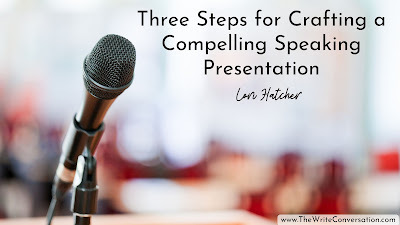
by Lori Hatcher
Your writing has opened up opportunities to speak. You realize your life experiences and spiritual insight can make a difference in other people’s lives. You know what you want to say, but you aren’t sure how best to say it.
Toastmasters International speaker Ryan Avery studied 25 years of the International Speech Contest winners to determine which elements are most important in crafting a memorable, moving, and motivating speech. He included these three elements in his speech, “Trust Is a Must,” and walked away as the 2012 Toastmasters International World Champion.
When he spoke to my Toastmasters International club, he shared a three-step formula that helped him craft his compelling presentation. We can apply these steps to our own speeches.
Step 1: Make Your Speech Simple—Simple Always Wins
Use an introduction (a hook), three supporting stories, and a conclusion that ties into your introduction. Choose one main point and use everything else to point to and reinforce your point.
Use a constant object, word, or phrase to connect your stories to your purpose. Sometimes this is called a “sticky statement.”
Remember that simple doesn’t have to be dry, dull, or boring. Look for ways to engage all five senses and incorporate intentional gestures to reinforce key points. Leverage the power of the pause for emphasis.
Resist the urge to be the hero in your own story. Let others learn from your mistakes and be sure God gets the glory, not you.
As with good writing, use as much active voice as you can to add emphasis and power to your presentation.
Step 2: Make your speech impactful
Find your passion and share it. If you could only tell one message to one person, what would that message be? Instead of “giving a speech,” share a message from your heart.
Ask, what story from my experience can help someone else? Be vulnerable. Don’t be afraid to tell on yourself, providing you do so in ways that are appropriate to your topic and your audience.
Step 3: Make Your Speech Relatable
Take time necessary to craft a title that inspires curiosity or interest.
Resist the urge to tell jokes. Share a failure instead. If you can laugh about your mistakes, and you invite your audience to laugh with you, they’ll find it easier to connect with you. It’s hard to relate to a perfect person.
With your family’s permission, use your them to be relatable. I mean, who can’t relate to a story about cute grandkids, a cuddly dog, or quirky in-laws?
Remember, dress to relate, not to impress. Speakers should dress one level above the audience’s dress, but don’t wear a tuxedo to a potluck. Dressing down can communicate disrespect for the audience, but dressing too far up can make you appear disconnected and superior. If you’re not sure what the dress will be, ask your event coordinator.
If you’re a writer, you’ve noticed that many of the components of a successful written presentation transfer over into a memorable, moving, and motivational speech. You may never become a Toastmasters International Champion of Public Speaking, but with a few tweaks and a nod toward stage presence, you can create a presentation that will delight your audience and allow you to share the message God has laid on your heart.
Now it’s your turn to join the conversation. Share your best tip for a successful speaking presentation in the comments below.
TWEETABLEThree Steps for Crafting a Compelling Speaking Presentation from Lori Hatcher on @EdieMelson (Click to Tweet)
 Lori Hatcher loves to inspire and equip others by sharing high-impact stories for spiritual transformation. A popular women’s ministry speaker and writing/speaking instructor, Lori is an Advanced Communicator Gold and Advanced Leader Bronze with Toastmasters International. She writes for Our Daily Bread, Guideposts, Revive Our Hearts, and Crosswalk.com. Check out her latest devotional, A WORD FOR YOUR DAY: 66 DEVOTIONS TO REFRESH YOUR MIND, from Our Daily Bread Publishing. Connect with her at LORIHATCHER.COM or on FACEBOOK.
Lori Hatcher loves to inspire and equip others by sharing high-impact stories for spiritual transformation. A popular women’s ministry speaker and writing/speaking instructor, Lori is an Advanced Communicator Gold and Advanced Leader Bronze with Toastmasters International. She writes for Our Daily Bread, Guideposts, Revive Our Hearts, and Crosswalk.com. Check out her latest devotional, A WORD FOR YOUR DAY: 66 DEVOTIONS TO REFRESH YOUR MIND, from Our Daily Bread Publishing. Connect with her at LORIHATCHER.COM or on FACEBOOK.
Published on March 21, 2024 22:00
March 20, 2024
A Pre-Conference P.R.A.Y.E.R. for Writers

by Ginny Cruz, MPA, PT
Conference season is here! Many of us are already busy creating one-sheets, writing book proposals, or penciling in classes and appointments.
But if you are new to writers conferences or have attended a few yet still feel unprepared, this article is for you.
My StoryAs a pediatric physical therapist, my writing has long consisted of medical record documentation and the occasional medical journal article. While I did well in English in school, the sciences were my love. There, writing was merely part of the job; it was not THE job.
In 2007, burned out from the stresses of my caseload and raising two active boys, I repeatedly called out to God for help and guidance. To my surprise, He placed on my heart a call to begin writing. “Write what?” I pleaded.
He remained quiet as I began the journey yet placed signposts along the way. Eventually, I found a writers critique group, where a member—a seasoned writer and English teacher—introduced me to creative writing. Wow, what a concept!
As I struggled to change my writing style to one less academic, the doubts that I had misheard God raged. The internal comparison games took on new levels of intensity. “These people have ALWAYS wanted to write. They’re real writers. What am I doing here?” peppered my sleepless nights.
Fast-forward to today. I have persisted with the call despite the mountains and valleys. Through the years, God has honed my skills and developed my new writing voice. The biggest reason I am still here is because God eventually led me from the first critique group to Word Weavers International. After joining them, doors began to open. Finally, I had found my team.
My First Writing ConferenceI attended my first writing conference in 2017, a decade after God called me to write. Like a fish out of water (I realize that’s cliché, but I like it!), fellow writer friends gave guidance and encouragement: “Go here” or “You need to meet with ______.”
Even though I did not feel ready or qualified, I did as they encouraged. Trusting God means going without knowing, so I went.
While more doors closed than opened at that first conference, my post-conference reflections revealed I was in a season of excess growth, trying to go in too many directions. God needed to prune some things for me to produce the fruit He wanted.
But as I look back, some of the friends I made at that first conference were ones God placed there. They have continued to guide me, hold my hand, and encourage me. Many saw my place in the industry long before I was ready or able.
That is why I confidently say that even though you may not feel ready or qualified, you are. God is prepared to work on you and through you.
My P.R.A.Y.E.R for YouP—PRAY over everything, whether it is your one sheet, book proposal, meetings, or classes. Ask God to direct every decision, appointment, and even your thoughts.
R—RESIST the doubts the evil one sends your way. REACH out to fellow writers who are friends and supporters and REQUEST prayer.
A—ACKNOWLEDGE God’s call. If He called you to write, then you are a writer. ACCEPT with a grateful heart where you are on the journey. Some are ahead of you, and others are behind. It will always be so.
Y— Say YES when God modifies your plans. Say YES to making mistakes, and say YES to the pruning required for you to bear fruit.
E—ENCOURAGE others. Everyone at the conference needs uplifting. Be the first to offer life-giving words to others. ENJOY the journey.
R—REMAIN faithful to God’s call. Conferences are opportunities to learn new information, lean on God's strength, and listen to that still, small voice. They are precious times away from the daily hustle and bustle. Use that time to RENEW your determination to stay the course God has laid before you.
I have discovered along the way that a writer’s life is just like life itself. There are mountains and valleys, laughter and tears, learning and relearning, and seasons. It is a journey along the path on which God has set your feet. No matter where you are on the trip, take heart and keep moving forward with your eyes on Jesus, the one for whom we all write.
TWEETABLEA Pre-Conference P.R.A.Y.E.R. for Writers from Ginny Cruz on @EdieMelson (Click to Tweet)
 Ginny Cruz, MPA, PT is a pediatric physical therapist, early intervention specialist, and award-winning author. Her writing encourages and teaches moms simple and effective ways to help their baby meet developmental milestones. In addition to writing, she enjoys hiking, reading, and camping with her husband. Find out more at ginnycruz.com, Instagram, or Facebook.
Ginny Cruz, MPA, PT is a pediatric physical therapist, early intervention specialist, and award-winning author. Her writing encourages and teaches moms simple and effective ways to help their baby meet developmental milestones. In addition to writing, she enjoys hiking, reading, and camping with her husband. Find out more at ginnycruz.com, Instagram, or Facebook.
Published on March 20, 2024 22:00
March 19, 2024
Why God’s Names Are So Important to Our Writing
by Katy Kauffman @KatyKauffman28
Do you have a favorite name for God? I like to call Him “Home.” He makes His home within us (John 14:23), and we find in Him a forever home for our hearts (Psalm 107:9) and a forever love to cherish (Jeremiah 31:3).
When we pray, we might call Him “Father,” “Abba,” or “Lord.” Focusing on His names in our prayer times can help us remember who He is and what He is capable of. Do you remember to include His names when you write?
When I was a teenager, hunting for God’s names in Scripture became one of my favorite Bible study tools. I kept a chart with three columns, and they were labeled “Father,” “Son,” and “Spirit.” Any time I studied a chapter and found a name for God, I put the name and its reference in the correct column and thought about why God included that name on purpose in the chapter.
This helped me to not only understand the passage better, but it gave me more of a well-rounded view of who God is. Including God’s names in our writing, can do the same thing. We can share with our readers a well-rounded and personal view of God and what He can do.
When we look at the beginnings of the nation of Israel in Genesis to Deuteronomy, we discover “the God who sees me” (Genesis 16:13 NIV) and the great “I Am” (Exodus 3:14 NKJV). We find courage in knowing God sees us and cares about us, and since He is the great I Am, nothing can stand in His way.
When we turn page after page in the book of Psalms, our hearts find comfort in knowing He is our Rock, the God of our salvation, and the LORD of hosts.
In the book of John, we find a Savior to believe in and a Shepherd to follow. We discover Jesus is the way and the truth and the life. We discover sustenance for our souls in the Bread of Life and quenched thirst for our spirits in the Living Water.
Scripture is filled with God’s names that teach us to trust Him, obey Him, listen to Him, and love Him. Let’s not forget to use the power of His names in our writing, so our readers can also trust Him and love Him more every day.
2 Categories of Questions to Maximize Studying God’s Names
What questions can we ask ourselves when we find a name for God in a Bible passage? Here are two categories of questions for understanding Scripture and making application.
To learn more about the passage we’re studying:If we’re studying a story in Scripture, why did the people in this story need to remember this name for God?Are there any promises from God that were attached to this name?How would this name have helped the people to respect God and trust Him more?How does their situation relate to our lives today, and how can we also trust God in similar ways?If we are studying one of Paul’s letters, why did the recipients of the letter need to remember this name for God? What difference would it make?When we find ourselves in a similar situation, how can we depend on God based on this name?
To learn more about God and our relationship with Him: What does this name tell us about the facets of God’s character?How does this name help us to love God now and forever?How does this name help us to meet life’s challenges with courage?How is this name a motivation for us to share the gospel, so others can know God like this?How does this name guide us to act and to use our abilities and resources for God’s kingdom?
If we take the time to look—really look—at God’s names in Scripture, we’re bound to find a fountain of truth and reasons to love Him. Talking about these names in our writing can inspire our readers to trust God more and more and to follow Him even when they don’t know how a trial will turn out.
What are your top two favorite names for God? How have they made an impact on your heart and mind? Tell us in the comments, and may God bless your treasure hunts in Scripture!
TWEETABLEWhy God's Names are So Important to Our Writing from @KatyKauffman28 on @EdieMelson (Click to Tweet)
 Katy Kauffman is an award-winning author, an editor of Refresh Bible Study Magazine, and a co-founder of LIGHTHOUSE BIBLE STUDIES. She loves connecting with writers and working alongside them in compilations such as For Love’s Sake: The Life-Changing Facets of Love in 30 Bible Studies, Devotions, and Christian Living Articles, which was a 2023 finalist in the Director’s Choice Awards. She also enjoys encouraging writers and giving writing tips in her writers’ newsletter called THE LIGHTHOUSE CONNECTION.
Katy Kauffman is an award-winning author, an editor of Refresh Bible Study Magazine, and a co-founder of LIGHTHOUSE BIBLE STUDIES. She loves connecting with writers and working alongside them in compilations such as For Love’s Sake: The Life-Changing Facets of Love in 30 Bible Studies, Devotions, and Christian Living Articles, which was a 2023 finalist in the Director’s Choice Awards. She also enjoys encouraging writers and giving writing tips in her writers’ newsletter called THE LIGHTHOUSE CONNECTION.In addition to online magazines, Katy’s writing can be found at CBN.COM, thoughts-about-God.com, and three blogs on writing. She loves to spend time with family and friends, create art and make crafts with her group MY ARTSY TRIBE, and tend the garden in the morning sun. She makes her home in a cozy suburb of Atlanta, Georgia. Connect with her on FACEBOOK and TWITTER.
Published on March 19, 2024 22:00
March 18, 2024
Seven Keys for Becoming a Successful Writer

by Dr. Katherine Hutchinson-Hayes @KHutch0767
I didn’t know what I was doing when I self-published my first book. My goal for that project was to help raise money for a family returning to the mission field in Mongolia. I thought the book was successful because I’d helped meet the intent, and the family was fully financed to live as missionaries. I had no clue about the impact of book launches, street teams, and utilizing social media to promote my book.
I also thought it’d be easy to get an agent and have my book sold to a traditional publisher. But, when I attended a writer’s conference shortly after my book’s debut, I discovered I was wrong, and I’d done almost everything backward. A few weeks after returning home, I received a rejection letter from a well-established literary agency who’d expressed interest. The main gist of the letter was I had no platform. I still use that letter as a blueprint for becoming a successful writer. Over the years, I’ve also discovered seven fundamental keys for accomplishing this feat.
7 Fundamental Keys to Become a Writer
1. Be your best: Becoming a successful writer requires tremendous effort, hard work, and dedication. We should put forward our best work, whether we plan to self-publish or find an agent or traditional publisher. This means editing and formatting our work appropriately, creating an intriguing blurb or synopsis, and designing an eye-catching cover to entice readers.2. Be ready: We only get one chance to make an excellent first impression. If we lose a reader or publisher early on, we’ll likely never be thoroughly polished and ready to be presented to the world.3. Be a reader: One of the best ways to improve our writing skills is to read. Reading not only helps us learn new things but also entertains us. It’s a way to support ourselves and other writers. We mustn’t forget to write reviews of the books we read, as this is a great way to connect with other writers and readers.4. Be realistic: It’s important to remember that not everyone will love our work, no matter how much our friends and family may support us. Everyone has different tastes in reading, and we need to be prepared for both positive and negative feedback.5. Be on social media: A social media presence is also crucial for writers. We must ensure people know who we are and where to find our work. Creating a website or blog is an excellent way to connect with potential readers and give them more information about ourselves and our work. We can also use platforms like X (Twitter), Facebook, Instagram, BookBub, Goodreads, or Pinterest to promote our work and connect with potential readers.6. Be a self-promoter: Marketing ourselves can be challenging, especially if we’re not used to talking about ourselves. However, it’s essential to promote our work through blog tours, interviews, networking with other writers, reviews, advertising, contests, newsletters, giveaways, and book signings. Remember, no one else is going to do it for us.7. Be a student: Mastering the craft of writing is vital. We must know how to combine words effectively, use proper punctuation, and avoid unnecessary adverbs or repeated information. We should also be skilled in storytelling and effectively telling a story. This takes time, practice, and patience.
Start with the basics and gradually build upon them when learning new skills. Whether it’s mastering the art of writing a compelling story, learning a new genre, honing our self-editing skills, or finding the perfect publisher for our work, it’s essential to take our time and go at our own pace. Everyone’s journey is unique, and there is no one-size-fits-all approach to learning and improving our craft. So, don’t be discouraged when encountering rejection letters, setbacks, or challenges. Stay focused, be patient, and keep working toward each goal. We can achieve our dreams and become successful writers with dedication and persistence.
TWEETABLE7 Keys for Becoming a Successful Writer from @KHutch0767 on @EdieMelson (Click to Tweet)
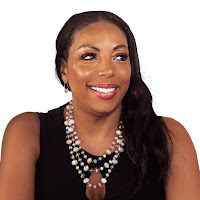 Dr. Katherine Hutchinson-Hayes is a review board member and contributor to Inkspirations (an online magazine for Christian writers), and her writing has been published in Guideposts. Her work in art/writing is distinguished by awards, including the New York Mayor’s Contribution to the Arts, Outstanding Resident Artist of Arizona, and the Foundations Awards at the Blue Ridge Mountains Christian Writer’s Conference (2016, 2019, 2021). She is a member of Word Weavers International and serves as an online chapter president and mentor. She belongs to FWA (Florida Writers Association), ACFW (American Christian Fiction Writers), CWoC (Crime Writers of Color),
Dr. Katherine Hutchinson-Hayes is a review board member and contributor to Inkspirations (an online magazine for Christian writers), and her writing has been published in Guideposts. Her work in art/writing is distinguished by awards, including the New York Mayor’s Contribution to the Arts, Outstanding Resident Artist of Arizona, and the Foundations Awards at the Blue Ridge Mountains Christian Writer’s Conference (2016, 2019, 2021). She is a member of Word Weavers International and serves as an online chapter president and mentor. She belongs to FWA (Florida Writers Association), ACFW (American Christian Fiction Writers), CWoC (Crime Writers of Color),AWSA (Advanced Writers and Speakers Association), and AASA (American Association of School Administrators). She serves on the nonprofit organization Submersion 14 board and the 540 Writer’s Community board and is an art instructor for the nonprofit organization Light for the Future. Katherine hosts the podcast Murder, Mystery & Mayhem Laced with Morality. She has authored a Christian Bible study for women and is currently working on the sequel to her first general market thriller novel. Her thriller A Fifth of the Story will debut in February 2024 through Endgame Press.
Katherine flourishes in developmental editing and coaching writers. She has a twenty-year career in education, leadership, and journalism. Katherine freelances as an educational consultant for charter schools, home school programs, and churches. In this role, she has written and edited curriculum, led program development, and helped manage growth facilitating and public relations.
She also works as an editor and book coach through her consulting business. Katherine provides skill, accountability, and professionalism so clients can begin, develop, and finish their writing projects for publication.
Published on March 18, 2024 22:00
March 17, 2024
Marketing to the Agents and Traditional Editors

by Karen Whiting @KarenHWhiting
To market to agents and editors in the traditional world, be sure your book is the right fit, create a stellar proposal, produce stellar writing, and come up with some great marketing ideas.
The Right Fit for an Agent
Agents know what they can place titles they place due to relationships with publishing houses . If the project matches an author's passion that makes it even better.
So, know the agents. Meet them at conferences and listen to their passions. Find out what they placed. Ask writer friends who publish in the same genre as you if their agent might be a good fit.
The Right Fit for Editors
Publishing houses have their own brands and lines, so study the catalogue. Some that carry fiction may carry mainly romance with strong female leads or mysteries with underlying stories of families. You want to have an editor think, 'This writer gets us."
In the proposal add within the description and hook, wording that fits their brand.
A Stellar Proposal
As a writing coach I see proposals that don't showcase the book or author well. You want to honestly share about the book, how it meets a felt need for readers, and what will motivate people to buy the book. You also need to show why you are the person to write it with a strong bio plus lists of what you've had published, sales figures of previous books, awards earned, and especially how you are poised to market the proposed book.
Excellence in Writing
Make sure others you trust review your writing and proposal. This can be a good critique group, a paid editor, or a fairly well published writing friend. It is not family, yourself only, or an unpublished writer.
Be sure the material is well-organized, with great flow, the best word choices, and readable for the intended audience. Be aware of the progression of the book and ideas presented, that it works together well and in a logical order. Create writing that is fresh with new ideas and solutions that are doable. Even in fiction, it's not just using the same old murder weapons in the same way, or the same plots, but new twists that grab reader's attention.
Make sure there's a satisfying ending for the reader of fiction or motivation that lets the nonfiction reader feel "I can do this" or "This will change my life."
Great Marketing Ideas
Name ideas and share how you will harness the power of them. Be specific and share results. This is when you build the marketing plan. Here are a few examplesArticles. I write for ____________- magazine with a distribution of ____________- and the editor is open to my writing articles related to this book. A few will be (name a few article titles). Or state (if the editor gives you stats, and be sure to ask). (The article I wrote for my previous release had 140,000 hits in 4 days and the bio included the book title).Speaking. I speak for ___________ groups in my (state, around the country, ...). This has included Name (places and audience sizes) or state a comment from the audience (recently I spoke at a woman's retreat of 60 women and at the end one woman jumped up and yelled, "This was the most refreshing retreat talk I have ever heard at a retreat.") Media. If you can post media you've been on, especially repeat guest spots do that). If not take training and state that you took media training, or state that you have been active with ABCs radio show telethon and they have invited you on when your book is published). Also share if you have developed a list of media that has guests on with similar topics and that you will contact them before your book' release).I have an email list of 1000 followers with an open rate of 53%. Since the engagement is very important, it better to have a good list of at least 1000 that reads it than a huge list where only a few read it.
Unique Marketing Ideas
Stand out from the crowd. Show something different.To connect to readers for my romance stories I'll be doing chocolate and rose parties and will ask my launch team to do the same. Anyone who sends me an email list of ten people who will attend the party will be sent (name prizes or special e-downloads). All these leaders will be entered in a drawing for (name prize)I've already spoken to the museum (name it) about my book and they agreed to have me do workshops there when the book releases). I plan to reach out to other similar museums.I have a connection to speak at (name a homeschool convention) and will have a booth there showcasing the book.My book for kids includes double Dutch jump roping. I plan to connect with the Heart Association for their Jump for Heart fund raising and will be a sponsor for my local heart group. [so see what's in your book that can connect to an association or group of women]
I love writing for traditional publishers, but it takes time to craft the right proposal. After sending a proposal if a great opportunity opens up, send an email with news to add to the proposal.
TWEETABLEMarketing to the Agents and Traditional Editors from @KarenHWhiting on @EdieMelson (Click to Tweet)
 Karen Whiting (WWW.KARENWHITING.COM) is an international speaker, former television host of Puppets on Parade, certified writing and marketing coach, and award-winning author of twenty-seven books for women, children, and families. Her newest book, The Gift of Bread: Recipes for the Heart and the Table reflects her passion for bread and growing up helping at her grandparent’s restaurant. Check out her newest book Growing a Mother’s Heart: Devotions of Faith, Hope, and Love from Mothers Past, Present, and Future. It's full of heartwarming and teary-eyed stories of moms.
Karen Whiting (WWW.KARENWHITING.COM) is an international speaker, former television host of Puppets on Parade, certified writing and marketing coach, and award-winning author of twenty-seven books for women, children, and families. Her newest book, The Gift of Bread: Recipes for the Heart and the Table reflects her passion for bread and growing up helping at her grandparent’s restaurant. Check out her newest book Growing a Mother’s Heart: Devotions of Faith, Hope, and Love from Mothers Past, Present, and Future. It's full of heartwarming and teary-eyed stories of moms.Karen has a heart to grow tomorrow’s wholesome families today. She has written more than eight hundred articles for more than sixty publications and loves to let creativity splash over the pages of what she writes. She writes for Crosswalk. Connect with Karen on Twitter @KarenHWhiting Pinterest KarenWhiting FB KarenHWhiting.
Published on March 17, 2024 22:00
March 16, 2024
Every Writer Needs a Facelift on Occasion

by Tammy Karasek @TickledPinkTam
I’m just going to say what I want to say and get it over with—writer, it’s time to clean your face. I’m not talking in the literal sense of washing your face with cleansing cream, but close to it. Hang with me a minute. Have you looked at the locations you have your bio, headshot, or about me information lately? We’re already into our 2024 writing/speaking conference season, so why not do a good clean now instead of the putting the task off? Conferees love to check out your social media and website as they plan their conferences. Make sure they are viewing the same person they will see when they look for you at a conference.
Three Things a Writer Should Update Regularly
First let’s start with your headshot. Be realistic, do you still look like that photo? Has your hair grown, changed color (ahem!) or maybe lost a lot of inches to a short style? If you’ve changed any of those items, it’s a great time to schedule a new photo shoot. If you’re going to any conferences soon with no time to get the photo done beforehand, most of the conferences now offer a Photographer who specializes in headshots. This is a great investment for your writing business and worth having a good photo shoot done by a professional photographer. You will use it on business cards, your website, bios on guest posts and more.
Next is that bio. You should have several bios done so no matter what size you need, the correct one to use is ready. Some of the guest blog posts you submit may have a specific number of words, often no more than fifty. Others may not have restrictions at all. Do your homework and send what they ask for. You could run into a problem if they only want a fifty-word bio and you sent your long one. They will then edit to their guidelines and what they come up with may not be what you would have preferred to have been shared. Take the time now and make your work easier down the road when a bio is needed.
For instance, at least every December, I look at my bio and see what has changed for me. New job title, new writing assignments, change of focus on website, etc. To take the time to read through this bio quarterly is also time well spent. I’ve read far too many bios for people that’s obvious they haven’t updated it for years. Years, I’m telling you. Don’t be that person.
The last item for today is your website. Have you gone to your website with the same mindset of a person who would visit the site for the first time? Look at that landing page. Can someone see you “before the fold?” Before the fold is where your screen will stop on a laptop or desktop before one would have to scroll to see more information about the website.
Does your header invite a reader in with a great title and tagline of what this website promises to deliver? Is it the current focus of your writing? Here’s an example: you started as a mommy blogger, but now your little one is a freshman. In college. Have your blog posts changed to empty nest topics? Then your title stating the site is a young mom blogging her way through diapers and terrible-two-tantrums won’t deliver the title’s promise. Back to the question above, does the first glance of your website state what you’re focus is at this time?
There are more items you can update, such as the bios on your social media sites, newsletter items, items within your website and more. The above three important and quick ones you could have done to start with a great facelift. If we all take the time each year—before we get too busy—we will best set ourselves up for success in our writing business. And who wouldn’t rather have those photos and bios ready instead of having to scramble to recreate a new one at 1:30 am when one is requested … hypothetically, of course. Ahem…cough.
The above suggestions are a couple from me, but what about you? What would you suggest, or what do you do to get ready for success each year to dust off your internet presence? Share with us in the comments below.
TWEETABLEEvery Writer Needs a Facelift on Occasion from @TickledPinkTam on @EdieMelson (Click to Tweet)
 Tammy Karasek uses humor and wit to bring joy and hope to every aspect in life. Her past, filled with bullying and criticism from family, drives her passion to encourage and inspire others and give them The Reason to smile. She’s gone from down and defeated to living a “Tickled Pink” life as she believes there’s always a giggle wanting to come out! A writer of Romance—with a splash of sass. She’s also The Launch Team Geek helping authors launch their books and also a Virtual Assistant for several best-selling authors. Don't miss her recent book, LAUNCH THAT BOOK, just released in November.
Tammy Karasek uses humor and wit to bring joy and hope to every aspect in life. Her past, filled with bullying and criticism from family, drives her passion to encourage and inspire others and give them The Reason to smile. She’s gone from down and defeated to living a “Tickled Pink” life as she believes there’s always a giggle wanting to come out! A writer of Romance—with a splash of sass. She’s also The Launch Team Geek helping authors launch their books and also a Virtual Assistant for several best-selling authors. Don't miss her recent book, LAUNCH THAT BOOK, just released in November. Her work was also published in a Divine Moments Compilation Book—Cool-inary Moments. She’s also the Social Media Manager for the Blue Ridge Mountains Christian Writers Conference, Founding President and current Vice-President of ACFW Upstate SC, and Founding President of Word Weavers Upstate SC. She’s a writing team member for The Write Conversation Blog, Novel Academy, MBT Monday Devotions, The Write Editing and more. Connect with Tammy at HTTPS://WWW.TAMMYKARASEK.COM.
Published on March 16, 2024 22:00
March 15, 2024
My List of Guidelines for Writers to Live By
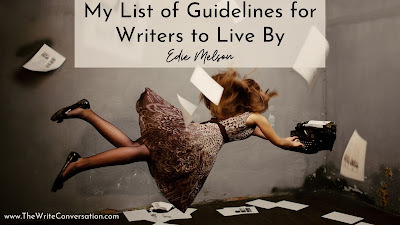
by Edie Melson @EdieMelson
Being a writer isn't easy. The writing life carries with it a good bit of chaos and angst. Add to that all the things writers are supposed to learn and remember and life can get crazy.
Truthfully, while there is a lot of information out there about things writers should remember and do, not all of it is good. We can find everything from hard and fast rules like, A real writer writes every day and Write what you know . Beyond that, we're often inundated with esoteric quotes and thoughts about writing and the writers life.
To help sort through some of that, I decided to share the guidelines I’ve found most useful in my own writing journey. These won’t all be yours, but perhaps they’ll be a jumping off place. Hopefully you can use them to come up with your own writer guidelines.
15 Helpful Guidelines for Writers
1. Your writing isn’t as good or as bad as you think it is. I’ve learned that I’m just not a good judge of what I write. Sometimes I know, but often my emotions get mixed up in what I’ve written and I lose my perspective. I’ve discovered that if I go with this truth, I’ll usually be correct.
2. Never stop learning. I spoke with a writer at a conference recently and this person told me they know they were a beginning writer because they were still spending time learning. I quickly stepped in and let this writer know that all the good writers—whether brand new or veterans of many years—were always still learning.
3. Don’t lord it over others. I haven’t met many people who do this on purpose. But sometimes it’s easy to slide into an “I know this and you don’t” attitude without meaning to. This is something I work hard to avoid.
4. Give back to the community. I think it’s very sad when I hear a writer say they’ve gotten to the point where a writing group doesn’t help anymore so they have quit. First, because I think feedback from readers is critical for all of us to keep our perspective. And second, because staying involved with those who aren’t as far along the writing road is a great way to give back. Many experienced writers helped me get where I am today and I’d be doing them a great disservice if I didn’t offer the same to others.
HOWEVER, this doesn’t mean we shouldn’t pick and choose how we give back. We must continue to grow and challenge ourselves and that means not only hanging around with those who are less experienced than we are.
5. Quit marketing to other writers. This one’s hard, but the fact is this. All writers (okay all good writers) read. BUT very few writers buy a lot of books. We’re given books and we write books, so we’re not good consumers. BEST ADVICE is this. Find out who your readers are and hang out with them.
6. Don’t force others to follow your process. I admit I get a little hot about this number. It really gets under my skin when others impose their way of walking out the writing journey. I hate hearing, “Real writers write every day.” That statement is so crushing to so many people.
7. Write regularly. This one is important, but be sure you read what I’ve written and don’t assume. Writing regularly—on a schedule is very different than being judge on whether or not you’re a writer because you write every day. This point is all about making writing a priority in your life. I know some writers who have professions that force them to only write on the weekends and they still do very well.
8. Embrace the critiques. Writers have to be able to accept critique. We need to know what’s wrong so we can do better. However you can apply this, it will serve you well on the writing road.
9. Enjoy the journey, not the destination. Learning to write is a process and it’s one where we are always improving but we have never arrived. By enjoying the process, the writing, the editing, the interacting with other writers, we guarantee lots of opportunity for joy.
10. Write for fun. It’s easy to get caught up in the striving when it comes to publishing. But that way of managing your writing life will cause burnout and steal your joy. Take time regularly to write something fun—no matter if it’s ever published or not.
11. Don’t forget your why. This is a big one for me. I know why I write—writing is the way I process life. If I couldn’t write, I think I’d die. That why has nothing to do with winning contests or publishing contracts. Writing is who I am. When I remember that, everything else falls into place.
12. Try something you’re sure you can’t do. Saying yes to hard things has brought me some of my greatest joys along the publishing journey. One of my favorite things in the world is writing marketing copy. Did I have formal training? NOPE. I just took a chance and tried it, found I liked it, and spent the next few years learning everything I could about being a copywriter.
13. Remain grateful. One of the biggest problems I, and other publishing professionals, see in the industry today is a whole lot of people who feel they are entitled. Entitled to be published, to be taught, to be first, etc. I’ve found that remaining grateful protects me from developing an entitlement mindset.
14. Don’t expect to be the exception. So many new writers come into the journey saying things like, “I know it’s done this way, but I think my situation is different.” Folks that is expecting to be the exception. Stop it! It’s called an exception because it rarely happens. Yes, we serve an amazing God and He can (and often does) step in when we least expect it. But even then the outcome is always better when we’ve done our part and learned what we needed to know.
15. Pray first. I don’t call myself a Christian writer. Instead, I refer to myself as a believer who writes. Because of that, I always want my writing journey to line up with God’s priorities—in every single way. To stay in step with God, I always pray before my fingers hit the keyboard.
These are the 15 guidelines I believe will serve every writer well. Now it’s your turn. What would you add to the list? I don’t pretend to have all the answers and I know you have something to share with me and with our community that will help us all! Be sure to leave your thoughts in the comments section below.
Don’t forget to join the conversation!Blessings, Edie
TWEETABLEMy List of Guidelines for Writers to Live By from @EdieMelson (Click to Tweet)
 Edie Melson is a woman of faith with ink-stained fingers observing life through the lens of her camera. No matter whether she’s talking to writers, entrepreneurs, or readers, her first advice is always “Find your voice, live your story.” As an author, blogger, and speaker she’s encouraged and challenged audiences across the country and around the world. Her numerous books reflect her passion to help others develop the strength of their God-given gifts and apply them to their lives.Connect with her on her website, through Facebook, Twitter and on Instagram.
Edie Melson is a woman of faith with ink-stained fingers observing life through the lens of her camera. No matter whether she’s talking to writers, entrepreneurs, or readers, her first advice is always “Find your voice, live your story.” As an author, blogger, and speaker she’s encouraged and challenged audiences across the country and around the world. Her numerous books reflect her passion to help others develop the strength of their God-given gifts and apply them to their lives.Connect with her on her website, through Facebook, Twitter and on Instagram.
Published on March 15, 2024 22:00



